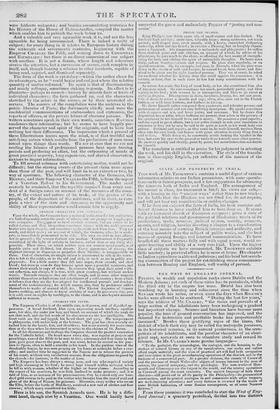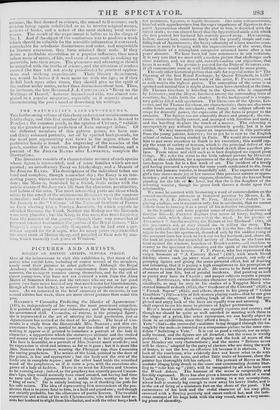THE WEST OF ENGLAND JOURNAL.
EnisTon in wealth and population ranks above Dublin and the Modern Athens ; yet each of these cities has its periodicals, whilst the third city in the empire has none. Bristol has also been brushing up in learning and refinement since the time when SAVAGE wrote his satire, or even since the days when RoscoE's books were allowed to be scattered. "During the last few years," says the address of Mr. CLARKE, " the tastes and pursuits of a large section of the inhabitants have been undergoing a gradual but important change. Science and literature have become more popular, the tone of general conversation has improved, and the demand for instructive and profitable books has proportionably increased." Besides these gratifying signs of the times, the district of which their city may be called the metropolis possesses, in its historical remains, in its natural productions, in the occu- pations of its inhabitants, and the peculiar character of an abori- ginal sept, materials at once to stimulate study and reward its labours. In Mr. CLARKE'S more precise language- " To the geologist, the mineralogist, the zoologist, and the botanist, to the student of natural history in any of its ramifications, our rocks and vallies afford ample material ; and the man of practical art will find both occupation and instruction in the great manufacturing operations of the district, and in the business of a commercial port. At a greater distance, the county of Cornwall and the province of South Wales offer objects of intense interest to the man of science, the general antiquary., and the philologist. The iron-works of Mon- mouth and Glamorgan are the largest in the world, and the mining operations in Cornwall among the most extensive. The ancient language of both these districts—still preserved in all its purity in the Principality—its grammatical construction, and its general analogies to and connexions with other tongues, are well-deserving attention ; and every fastness is crowned by the traces of some British habitation, of some Boman encampment, or of some Norman fortress."
From these premises it was concluded to start the West of Eng- land Journal; a quarterly periodical, divided into two distinct
sections, the first devoted to science, the second to literature.; each division being again subdivided so as to receive original essays, reviews of books, and a notice of the more striking local occur- rences. The result of the experiment is before us in the shape of Ne. I. And if the object of the conductors was to produce a work which should be valuable for the scientific information it conveyed, remarkable for scholastic distinctness and order, and respectable for literary execution, they have attained their ends. If they desire a profitable circulation or a popular influence, they must infuse more of nerve, of life, and even of mere craft in cooking up materials, into their pages. The pleasures and advantages should be mingled with the truths of :Aimee, and the attention of readers excited (for they will not study periodicals) by practical applica- tions and striking experiments. Their literary deliartment, too, would be better if it were more up with the age; or if they do fall back upon other times, they should give us the spirit of the author under notice, rather than discussions about him. Thus, for instance, the late Reverend J. J. CONY/1E ARE'S " Essay on the Writings of Ilesiod,- however learned and able, was almost mis- placed in a popular magazine, especially as it scarcely aimed at characterizing the poet's mind or describing his writings.
•



























 Previous page
Previous page